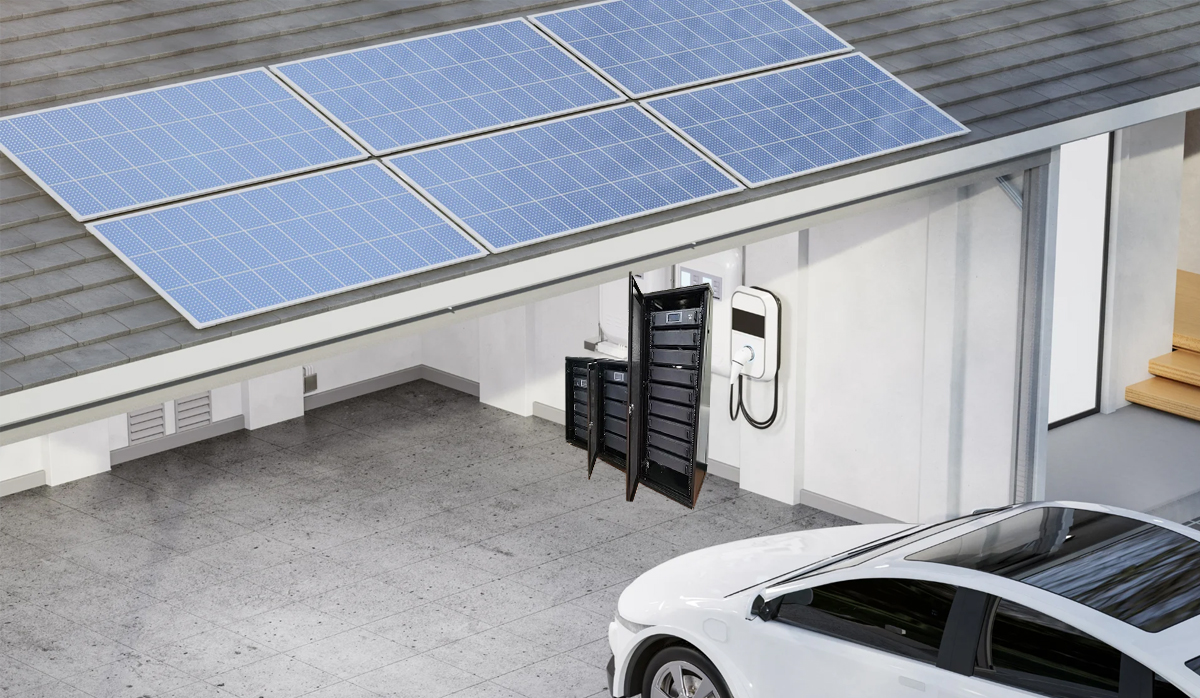¿Puedo usar baterías de coche para solar?? Una guía completa sobre la elección de la batería solar correcta
1. Introducción
Con la adopción cada vez mayor de la energía solar, Muchos propietarios de viviendas y pequeñas empresas se preguntan si pueden reutilizar las baterías de los coches para sus paneles solares.. Si bien puede resultar tentador utilizar baterías de automóvil disponibles, A menudo no están diseñados para las demandas específicas del almacenamiento de energía solar..
En este articulo, Exploramos las diferencias entre baterías de automóvil y baterías solares dedicadas., y analizamos por qué invertir en un sistema diseñado específicamente, como un batería de litio de montaje en rack—puede ofrecer un rendimiento y una longevidad significativamente mejores.
Aprovechando los conocimientos de expertos de la industria, Le proporcionaremos un desglose claro de lo que debe considerar al planificar su sistema de almacenamiento de energía.. Nuestra guía está diseñada para ayudarle a tomar una decisión informada que optimice tanto la eficiencia como la rentabilidad..
2. Comprender los requisitos de almacenamiento de energía solar
Antes de profundizar en los detalles, Es fundamental comprender qué necesita su sistema de energía solar en términos de almacenamiento de baterías.. Los paneles solares generan electricidad durante el día., pero sin almacenamiento adecuado, Es posible que no tengas electricidad cuando el sol no brilla..
Los puntos clave incluyen:
- Consumo diario de energía: Determine su kilovatio-hora promedio (kWh) uso para decidir sobre la capacidad de almacenamiento general.
- Profundidad de descarga (Departamento de Defensa): Las baterías solares a menudo deben ciclarse (cargado y descargado) a diario. Un DoD más alto garantiza más energía utilizable.
- Fiabilidad a largo plazo: Las baterías solares deberían ofrecer un ciclo de vida prolongado, lo que significa que se pueden cargar y descargar muchas veces sin una pérdida significativa de capacidad.
Estos requisitos se cumplen mejor con baterías diseñadas específicamente para aplicaciones solares que con baterías de automóvil., que están optimizados para abreviar, ráfagas de alta corriente en lugar de rendimiento de ciclo profundo.
3. Baterías de coche vs.. Baterías solares dedicadas

Baterías de coche, típicamente a base de plomo-ácido, Están construidos para proporcionar una rápida ráfaga de energía para arrancar un motor.. Están diseñados para una alta potencia de arranque en lugar de una producción de energía de larga duración.. Aquí hay una comparación lado a lado:
Baterías de coche:
- Diseñado para: Corto, intensas explosiones de poder.
- Ciclo de vida: Capacidad limitada de ciclo profundo; no es ideal para descargas profundas diarias.
- Mantenimiento: A menudo requieren mantenimiento regular; sensible a la descarga prolongada.
- Actuación: Puede degradarse rápidamente bajo los ciclos continuos que exigen los sistemas solares..
Baterías solares dedicadas:
- Diseñado para: Continuo, ciclos repetidos y descarga profunda.
- Ciclo de vida: Diseñado para miles de ciclos, asegurando la longevidad.
- Eficiencia: Optimizado para una producción de energía sostenida y alta eficiencia.
- Integración: Funciones de soporte como sistemas de gestión de batería. (BMS) para seguridad y rendimiento.
Si bien las baterías de automóvil pueden parecer rentables inicialmente, sus limitaciones en el ciclo de vida, eficiencia, y la confiabilidad general puede generar mayores costos a largo plazo y un menor rendimiento del sistema.. Por lo tanto, Se recomienda encarecidamente el uso de baterías solares dedicadas para una instalación solar confiable y eficiente..
4. Las ventajas de una batería de litio de montaje en bastidor

Cuando se trata de elegir la solución de almacenamiento adecuada, a batería de litio de montaje en rack es una excelente opción para sistemas de energía solar. A diferencia de las baterías de coche, Las baterías de litio de montaje en bastidor están diseñadas específicamente para las demandas de ciclo profundo de las aplicaciones solares..
¿Por qué elegir una batería de litio de montaje en bastidor??
- Optimizado para uso continuo: Estas baterías están diseñadas para descargarse y recargarse muchas veces., asegurando que cumplan con las demandas del almacenamiento de energía solar.
- Eficiencia superior: Una mayor densidad de energía y una mejor retención de carga significan más energía almacenada disponible cuando sea necesario.
- Seguridad mejorada y gestión térmica: Los sistemas integrados de gestión de baterías garantizan un funcionamiento seguro, Protección contra sobrecarga, calentamiento excesivo, y otros problemas potenciales.
- Diseño que ahorra espacio: Los sistemas de montaje en bastidor son compactos y se pueden integrar fácilmente en configuraciones existentes, especialmente donde el espacio es un bien escaso.
Para más detalles sobre esta solución, echa un vistazo a nuestro Batería de litio de montaje en rack página del producto.
5. Consideraciones clave al elegir una batería solar
Al planificar su sistema de energía solar, varios factores deben guiar su selección de batería:
a. Compatibilidad con sus paneles solares
Su sistema de almacenamiento de baterías debe manejar eficientemente la energía producida por sus paneles solares.. La combinación adecuada entre la salida de los paneles y la capacidad de la batería es vital para un rendimiento óptimo.
b. Profundidad de descarga (Departamento de Defensa)
Un DoD más alto significa que puede utilizar un porcentaje mayor de la capacidad de la batería. Las baterías solares dedicadas están diseñadas para soportar descargas más profundas sin degradación prematura..
do. Ciclo de vida y durabilidad
Los sistemas solares dependen de baterías que pueden soportar miles de ciclos. Invertir en una batería con un ciclo de vida prolongado garantiza que el sistema siga siendo rentable durante toda su vida útil..
d. Gestión de seguridad y batería
Los sistemas de baterías de calidad incluyen sistemas integrados de gestión de baterías. (BMS) que regulan la carga, monitorear la temperatura, y mantener la seguridad general. Esto es especialmente importante en una configuración de montaje en bastidor donde se interconectan varias celdas..
mi. Escalabilidad y preparación para el futuro
A medida que tus necesidades energéticas crecen, tener un sistema modular permite una fácil expansión. Productos como el Batería de litio apilable.
6. Integrando productos solares GYCX en su sistema
En GYCX Solar, Nuestra completa línea de productos está diseñada para garantizar que todos los componentes de su sistema solar funcionen en armonía..
- Batería de litio de montaje en rack: Como se discutió, Estas baterías son ideales para el almacenamiento de energía de ciclo largo.. Forman la columna vertebral de su banco de baterías solares., ofreciendo un rendimiento confiable. Obtenga más información en nuestra página de producto.
- Batería de litio apilable: Para una solución de almacenamiento de energía escalable que crece con sus necesidades, considere nuestra opción modular. Consulta los detalles en nuestro Página de batería de litio apilable.
- inversor solar: Ningún sistema solar está completo sin un inversor de alta eficiencia para convertir la energía CC almacenada en energía CA utilizable.. Explorar nuestro Ofertas de inversores solares para una combinación perfecta con su banco de baterías.
Al integrar cuidadosamente estos productos, usted puede construir un sistema de energía solar que no sólo satisfaga las demandas energéticas actuales sino que también sea adaptable al crecimiento futuro.
7. Consejos prácticos para optimizar el almacenamiento de energía
Además de seleccionar la batería adecuada, Considere lo siguiente para maximizar el rendimiento de su sistema.:
Monitoreo y mantenimiento regulares
- Escucha: Utilice herramientas de gestión de energía para realizar un seguimiento continuo del rendimiento de la batería y la eficiencia general del sistema..
- Mantenimiento: Siga los programas de mantenimiento recomendados por el fabricante para extender la vida útil de su banco de baterías..
Consideraciones ambientales
- Control de temperatura: Las baterías de litio funcionan mejor dentro de rangos de temperatura específicos. Asegure una ventilación adecuada o control climático en el área de almacenamiento de baterías..
- Las mejores prácticas de instalación: La instalación profesional puede mitigar los riesgos relacionados con el cableado, montaje, e integración de sistemas. Adherirse a las mejores prácticas ayuda a maximizar tanto la seguridad como la eficiencia..
Prepare su configuración para el futuro
- Plan de expansión: Diseñe su sistema teniendo en cuenta la escalabilidad. Las soluciones modulares le permiten agregar fácilmente más capacidad de batería cuando sea necesario.
- Mantente informado: Manténgase al día con las tendencias de la industria y los avances tecnológicos.. Esta educación continua puede guiarlo hacia soluciones aún más eficientes en el futuro..
8. Conclusión

Si bien la idea de utilizar baterías de coche para almacenar energía solar puede parecer inicialmente rentable, simplemente no están diseñados para las demandas de ciclo profundo de un sistema solar. Soluciones dedicadas como la Batería de litio de montaje en rack proporcionar un rendimiento superior, seguridad, y escalabilidad, convirtiéndolos en la opción preferida para instalaciones solares modernas.
Evaluando cuidadosamente sus necesidades energéticas, comprender las métricas clave de la batería, e integrando componentes de alta calidad de GYCX Solar—incluido nuestro Batería de litio de montaje en rack, Batería de litio apilable, y inversor solar—Se puede construir un sistema solar que sea robusto., eficiente, y preparado para el futuro.
Aproveche los beneficios de la tecnología diseñada específicamente y asegúrese de que su sistema de almacenamiento de energía esté optimizado para brindar confiabilidad y rendimiento a largo plazo..


